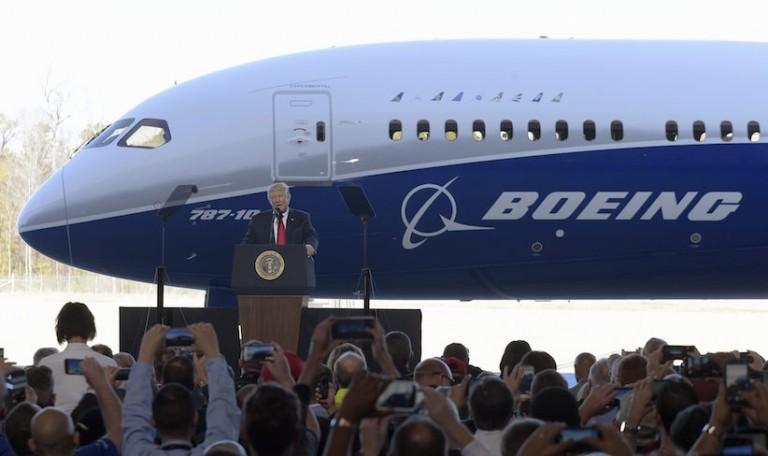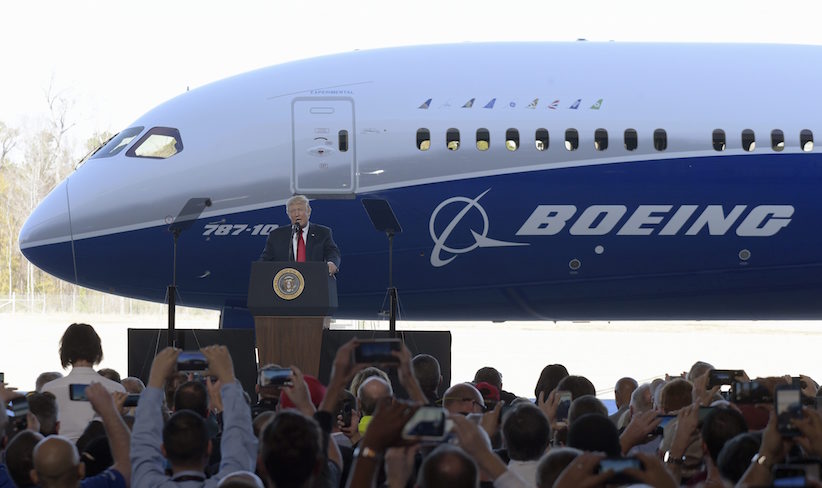Trump may create jobs, just not in America
Rather than make America seem more appealing to employers, Trump could nudge companies to consider expanding somewhere other than America

President Donald Trump speaks in front of the Boeing 787 Dreamliner while visiting the Boeing South Carolina facility in North Charleston, S.C., Friday, Feb. 17, 2017. Trump visited the plant before heading to his Mar-a-Lago estate in Palm Beach, Fla. for the weekend. (AP Photo/Susan Walsh)
Share

A late Canadian politician shared some wisdom with me about politics, on a golf course years ago. A decent, intelligent—occasionally a bit coarse fellow (eg. after hitting a good drive, proudly announced “Got both cheeks into that one”)—he was astute about how people interpret politicians.
He said it was useful for voters to know who your allies were—but just as useful for them to know who you truly didn’t see eye to eye with. That voters have a clearer picture of who you are by seeing the edges and lines you choose to draw.
Watching President Donald Trump in his first month in office brought this memory back. If most newly elected presidents make a point of defining their allies and opponents crisply, Trump is on a different path. He’s leaving the impression that he has a small list of friends, and a broad and lengthening list of foes. Perhaps this isn’t keeping him up at night.
MORE: What Does Trump’s ‘Buy American’ policy mean for Canada?
But one aspect of how he defines himself carries more political risk than any other. Trump has bet everything on the idea that he can get companies to create more jobs in America. Yes, he’s talked about fighting crime and making better procurement deals and replacing Obamacare, but most voters will focus on one promise: a massive upswing in U.S. job creation.
America’s economy is the strongest in the world in no small measure because American entrepreneurialism is deeply intertwined with the rest of the world. America’s companies serve customers everywhere. Sell products to everyone. Own companies in every corner of the world. They buy materials and services from wherever makes sense, constantly looking to make their value chains efficient and their companies profitable.
American capital scours the world looking for ideas that will reward American investors. America’s industrial revolution created generations of great wealth, and the technological revolution has repeated this success.
When Donald Trump talks about lowering corporate taxes, he knows that many corporations will take a fresh look at building capacity and hiring workers in the U.S., based only on a lower tax rate.
But the rest of what Trump is doing or saying might give pause to a lot of other major employers.
Rather than make America seem more appealing, he may be misunderstanding what makes many companies tick. He might actually be nudging them to consider building somewhere other than in Trump’s America.
For example, in Silicon Valley, the driving force of America’s economic growth in recent years, many are understandably troubled by the comments of his chief strategy advisor, Steven Bannon, who has complained that too many tech CEOs were immigrants from Asia.
Beyond the tech sector, many of the greatest companies in the world have built their success by attracting top-quality people, creating workplaces that embrace diversity, gender equity, indifference to sexual orientation, faith, and family makeup.
They attract the best talent from around the world and put people wherever they need to be to propel better returns. American pharmaceutical companies, financial services companies, consulting giants, engineering behemoths, food and beverage leaders—these companies thrive on mobility, flexibility and a global vision. Confused travel restrictions and border interrogations won’t help them grow, or grow jobs in America.
In the last several weeks, more than 200 major companies, from Walmart to Xerox to Levi Strauss, have banded together to fight the idea of a border adjustment tax. These companies say the 42 million people who work for them would find their jobs threatened, and consumers would see their cost of living rise.
Many of the world’s leading companies have pledged to achieve and invest in environmental goals, including emissions reduction. As Trump guts environmental regulations—if he creates a built-in advantage for browner over greener companies—will these companies reverse their commitments to make a buck in the U.S., or look elsewhere to find places where they can count on public policy that supports a transition to cleaner energy use, greener process improvements, and clean technology innovation?
Trump has been ordering deep cuts in regulations. It’s hard not to imagine that Congress and a future president might, before long, rebuild what he undoes. Large, complex enterprises see stable regulations as essential to business success by reducing consumer friction and litigation risks. They want compliance costs to be steady and predictable.
MORE: What Canada’s trade strategy should look like under Trump
By promising to rip up long-established trade links, disrupt global movements of people, ruminate about conflict with China and Iran and offer tepid commitment to NATO and European allies, Trump may be on a collision course with the world’s biggest companies and best job creators. American companies might not all like where this is going, and imagine how French, German, Chinese, and British companies might feel about putting new investments in an America with restrictive, chaotic policies.
Trump is marketing America as a place built for enterprises content to focus only on the American domestic market. Make it here, sell it here. The rest of the world? That’s up to the rest of the world.
By any objective measure, that leaves a smallish list of potential allies—at least compared to the long list of companies that thrive by doing business with the rest of the world, that care about the environment, minority protection, women’s and LGBTQ rights and recruiting the best talent in the world.
If President Trump shapes American policy to support companies that prefer to think small and turn back the clock, how many might look elsewhere to grow, and consider where else in the world they might find it more attractive to locate?
Bruce Anderson has been a prominent pollster, communications counsellor and political analyst in Canada for many years. Earlier in his career, he worked on election campaigns for both the Progressive Conservatives and the Liberals, but does not work for any political party now. For several years he was a regular member of CBC’s popular At Issue panel. He is the chairman of Abacus Data and Summa Communications. He wishes readers to know that one of his daughters is director of communications to Prime Minister Justin Trudeau.